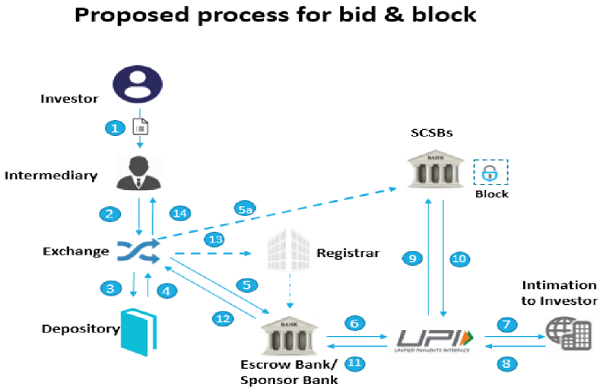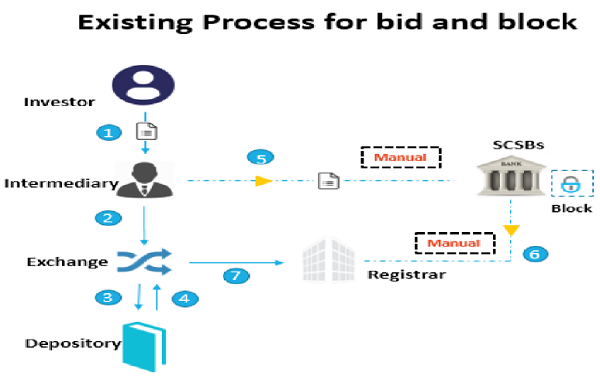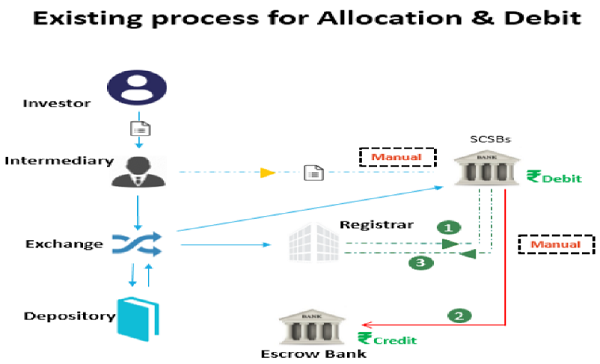Securities and Exchange Board of India
Jul 25, 2018
PR No.: 28/2018
SEBI Issues Consultation Paper on “Revisiting the public issue process”
SEBI has placed a Consultation Paper on “Revisiting the public issue process” on the website for public comments.
The full text of the Consultation Paper is available on the website www.sebi.gov.in. Comments are invited on the Consultation Paper latest by August 15, 2018.
Consultation Paper on “Revisiting the public issue process”
Revisiting the public issue process
Securities market, including the market for public offerings, is dynamic and needs to keep pace with the evolving economic and technological environment. In order to keep pace with the change, there has been a commensurate change in the regulatory framework governing the primary market.
SEBI in its endeavour to provide issuers and investors with an efficient mechanism for raising funds, has been continuously striving to streamline the process and methodologies associated with public issue fund raising process.
Towards this end, in order to enable issuers to raise capital in the shortest possible time span and to reduce market risk for investors as well as issuers, the time duration from issue closure to listing was shortened from 12 days to 6 days with effect from January 01, 2016, by obviating the use of cheques and making Application Supported by Blocked Amount (ASBA) mechanism as the sole payment mechanism in public issues.
SEBI has been exploring ways and means to further streamline the process, including shortening the timeline from 6 days.
In view of the significant developments in the payment mechanisms, it is felt that the Unified Payments Interface (UPI), a process for electronic funds transfer launched by Reserve Bank of India (RBI) and National Payments Corporation of India (NPCI) in March 2016, could be incorporated with ASBA mechanism to further improve the efficiency of the process.
As participation and contribution from all stakeholders almost invariably precedes any successful change in regulatory framework, the instant paper is to seek public comments on the proposal to use UPI with ASBA mechanism in public issues.
1. Background
1.1. SEBI Board in its meeting held on June 23, 2015, approved the proposal to reduce the post issue timeline for listing from T+12 days to T+6 days (where T is the date of closure of public issue) and ASBA was made mandatory for all categories of investors.
2. Need for review
2.1. Currently, the shares of the company are listed on the stock exchanges on 6th working day from the closure of the issue.
2.2. An investor can submit application for subscribing to a public issue through the following channels, with ASBA as the sole mechanism for making payment:
a) Self-Certified Syndicate Bank (SCSB) – Submission of application form, physically at the branch of SCSB, i.e. investor’s bank, or online platform if provided by the SCSB.
b) SEBI registered Broker / DP / RTA (Intermediaries) – Submission of physical application with any of the intermediary or through the online platform, if provided by the respective intermediary.
2.3. To enable issuers to raise capital in the shortest possible time span and to further reduce market risk for investors as well as issuers, the existing public issue process was examined. Based on such examination it is noted that while the ASBA mechanism has resulted in various benefits to issuers and investors, certain activities in the process, particularly relating to retail investor applications submitted with the intermediaries, could be further streamlined.
2.4. The current process for applications submitted with an intermediary, is summarized as under:
Bidding and validation process
a) The application form, containing the investor’s bid and bank details, is submitted by the investor with the intermediary.
b) The intermediary upon receipt of application uploads the bid in the stock exchange platform. The data uploaded in the stock exchange platform is validated for Demat account details and PAN with the depository. Thereafter the intermediary forwards the forms to the investors’ bank (one of the SCSBs) for blocking of funds.
c) Investors bank upon receipt of such form from the intermediary, undertakes the process of verification of investors’ signature, blocking of funds in investors account, and updating the bid file with account number and block status.
d) The said bid file is then provided to RTA for reconciliation of bid data with block of funds corresponding to such bids.
Allocation and debit process
e) After the process of bid and blocking, the basis of allotment is finalized and the details are shared by registrar with SCSBs for transfer and unblocking of funds.
f) SCSBs transfer funds to public issue escrow account for shares proposed to be allotted, unblock remaining funds/accounts and provide confirmation to registrar in respect of the same.
g) On confirmation of completion of aforesaid process, including credit of shares, Stock Exchanges grant listing approval and the trading commences from 6th working day.
2.5. The activities in the aforesaid process which require streamlining are summarized as under:
a) Validation of DP ID and PAN of investors with depository, on real time basis vis-a-vis current batch processing;
b) The manual process of segregation and physical delivery of application forms by the intermediary to the branches of over 60 SCSBs in each location, particularly considering the high volume of applications which are bid and uploaded on T day (issue closure day) and are received by Banks on T and T+1 day;
c) The manual process of, verification of investors’ signature, blocking of funds in investors account, and updating the bid file with details of account number and block status;
d) Post closure of the offer, the manual process of RTA obtaining confirmation of block of funds from each SCSBs and post finalization of basis of allotment sending separate instructions to each of SCSBs for debit and unblock of
2.6. While, it is desirable, to minimize the market risk for issues as well as investors is minimized by reducing the time gap between issue closure and listing, and to reduce the number of instances of failure to bid/block on account of above activities, the said objectives may not be met by keeping the present mechanism, including the current T+6 days timeline, intact.
2.7. In view of the above, it is proposed to use an alternate payment mechanism, which while retaining the benefits of ASBA, would further streamline the public issue process and aid in attaining the aforesaid objectives.
3. Review process
3.1. It was felt that the possibility of introducing a faster and efficient alternate mechanism, for blocking and payment of funds, may be explored to streamline the aforesaid activities and reduce the dependency on manual processes.
3.2. Accordingly, SEBI had discussions with the NPCI to explore the use of a payment mechanism, which, while retaining the benefits of ASBA i.e. blocking of funds, would increase the efficiency of the existing system and curtail the need for manual intervention at various stages in the process.
3.3. Based on discussions for simplifying the process of investing in public issues, use of UPI mechanism, with suitable modifications relating to ASBA was suggested.
3.4. Unified Payments Interface (UPI) is an instant payment system developed by the National Payments Corporation of India (NPCI), an RBI regulated entity. The present UPI system allows instant transfer of money between any two person’s bank accounts using a payment address which uniquely identifies a person’s bank a/c.
For e.g., a person can create a payment address linked to his / her bank account which would be in the format xyz@bankname. One may share the payment address with any other person to receive payments or collect money, without the need to provide a bank account number/ IFSC code, etc.
3.5. It was suggested that for the purpose of public issues, the UPI system would allow the investor to authorize blocking of funds for making application, as is done using ASBA.
3.6. SEBI also held consultations with various market participants, consisting of Stock Exchanges, Depositories, Registrar & Share Transfer Agents (RTA), Merchant Bankers, Stock Brokers and Banks wherein the proposed framework with use of UPI was deliberated and broadly agreed upon by the participants.
3.7. During the aforesaid deliberations, the participants indicated that given the amount per application for Qualified Institutional Buyers (QIBs) and Non-Institutional Investors (NII) greater than the proposed limit of 2 lacs in UPI and considering that the number of applications in a public issue by such investors is very small, the existing process may continue for QIBs and NIIs.
3.8. Additionally, it was indicated that the existing channel of submission of application forms directly with SCSBs, by all category of investors, may continue as an alternative to the proposed framework.
4. Proposal
Based on such consultations, the broad process flow for retail investor applications submitted through intermediaries in public issues, using the UPI mechanism, would be as under:
A. Bidding and validation process
4.1. Before submission of application with the intermediary, the investor would be required to create a UPI ID (xyz@bankname), with a maximum length of 45 characters, including the bank name. The process for creating a UPI ID would be provided by the investorȂs bank.
4.2. Investor will fill in the bid details in the application form as per the existing process along with his! her UPI ID i.e. use only his ! her own bank account linked UPI ID with application.
4.3. As per the existing process, investor may submit the application with any of the intermediary, who, upon receipt will upload the bid details along with UPI ID in the stock exchange bidding platform.
4.4. Once the bid has been entered in the bidding platform, the exchange will undertake validation of the PAN and Demat Account details of investor with the depository. This process is proposed to be carried out on a real time basis between the stock exchange and depository.
4.5. Post such validation, the stock exchange will electronically share the bid details along with investors UPI ID, with the Escrow/Sponsor Bank appointed by the issuer. The Escrow / Sponsor Bank will initiate a mandate request on the investor i.e. request the investor to authorize blocking of funds equivalent to application amount in his / her bank account and subsequent debit of funds in case of allotment.
B. Block process
4.6. The request raised by the Escrow/Sponsor Bank, would be electronically received by the investor as an intimation on his / her bank provided mobile application.
4.7. Investor will validate the request on his mobile application by logging into the mobile application by entering his UPI PIN / login pin.
4.8. Upon validation of block request by the investor, the said information would be electronically received by the investors’ bankǰ where the funds, equivalent to application amount, would get blocked in investors account.
4.9. The information containing status of block request (e.g. – accepted/decline/pending) would be shared by the investors’ bank with the Escrow/Sponsor Bank, which in turn would be shared with stock exchange and would be displayed on stock exchange platform for information of the intermediary.
4.10. Intimation regarding confirmation of such block of funds in investors account would also be received by the investor.
4.11. As per the existing process, the retail investors would continue to have the option to modify or withdraw the bid till the closure of the bidding period. For each such modification of bid, investor will submit a revised bid and shall receive a fresh block request to validate.

C. Post issue closure – allocation, debit, credit of shares and listing
4.12. The registrar, based on information of bidding and blocking received from stock exchange, would undertake reconciliation of the bid data and block confirmation corresponding to the said bids and prepare the basis of allotment.
4.13. Upon approval of basis of allotment by Stock Exchanges, RTA will give instructions to sponsor bank to credit funds in the public issue escrow account and unblock the excess money in the investors account.
 4.14. Upon confirmation of receipt of funds in the public issue escrow account, shares would be credited to the investor’s account
4.14. Upon confirmation of receipt of funds in the public issue escrow account, shares would be credited to the investor’s account
4.15. Thereafter, Stock Exchanges will issue the listing approval and trading is expected to commence from next working day.
5. Benefits from proposed framework
The implementation of the above proposed framework, would result in following benefits:
5.1. DP ID and PAN validation would be real time;
5.2. No physical movement of application forms from intermediaries to SCSBs;
5.3. Automated verification of investor signature and blocking of funds;
5.4. Single point of contact for follow-up by RTA, for block of funds and subsequent debit and unblocking of funds.
5.5. On account of above, the post issue timelines are expected to reduce from T+6 days to T+3 days and also result in reduction in manpower costs.
6. Applications submitted directly with SCSB
6.1. For application submitted directly with the SCSB, by any category of investor i.e. Retail, QIB and NII, existing process of bidding and blocking of funds by the SCSB shall continue.
7. QIB and NII applications submitted with intermediary
7.1. Similarly, for applications submitted by NIIs and QIBs with the intermediary, existing process of bidding by intermediary and blocking of funds by SCSB shall continue.
8. Proposed schedule of major activities
The day wise activity schedule with expected timelines would be as under:
| Categories | T-3 to T day | T+1 day |
| Bids by Retail investors with intermediaries
(Broker / RTA /DP) |
Investor would fill in the bid details in the application form as per the existing process along with his! her UPI ID i.e. use only his / her own bank account linked UPI ID with application.
Intermediary will upload the bid data along with UPI ID in Stock Exchange Platform. Upon upload of above information by intermediary, investor would receive an intimation on his/her mobile, seeking authorization to block funds equivalent to bid amount and subsequent debit funds in case of successful allotment. Investor may confirm the block of funds anytime during this period. Investor would continue to have the option to modify / withdraw the bid during this period. |
Investors would have time till 12:00 p.m. on T+1 day to act upon the request for block of funds, post which all pending requests will automatically lapse. As per the existing process, no modification /withdrawal will be allowed on after T day. Escrow/Sponsor Bank to provide confirmation on bank-wise blocking of funds to Stock Exchange latest by 2:00 p.m. |
| Bids by QIBs and NIIs with intermediaries | Investor will submit the application form with intermediary without UPI ID.
Intermediary will upload the bid data in Stock Exchange Platform as per the existing process. Intermediary will send the forms of QIBs and NIIs to respective branch of SCSB for blocking of funds. |
Sending of applications which are bid on last day To respective SCSB branch latest by 10:00 a.m. SCSBs not to accept application forms after 10:00 a.m. SCSBs to provide Final Collection certificate w.r.t QIB and NII applications, to RTA, latest by 2:00 p.m. |
| Bids by Retail, QIBs and NIIs with SCSBs | Investor to submit application form with SCSB for bidding and blocking of funds.
SCSB to upload the bid data in the Stock Exchange platform and block the funds in the investors account. |
SCSBs to provide Final Collection certificate, to RTA, latest by 2:00 p.m. |
–
| Categories | T day | T+1 day | T+2 day |
| Common activities for all categories | Instructions to depositories for Pre Issue capital Lock in post closure of bidding period. |
Issuer to approve prospectus
Filing of prospectus with Registrar of Companies (ROC) latest by 5:00 p.m. RTA to undertake “Technical Rejection” test based on electronic bid details and prepare list of technical Draft basis of allotment to be submitted with Stock Exchange by RTA latest by 8:00 p.m. Finalization of basis latest by 11:00 p.m. on the basis of receipt of filing of prospectus |
Transfer of funds to Public Issue escrow account/ and unblocking of funds by 2:30 p.m.
Issuer to approve allotment. Filing of documents with Filing of listing applications along with all other relevant documents with stock exchange Receipt of confirmation of credit of shares and lock-in of shares from depositories latest by 6:00 p.m. File demat credit and unblock confirmation with exchange and obtaining trading permission latest by 7:00 p.m. Receipt of Listing and Trading Approvals latest by 8:00 p.m. |
Expected commencement of trading on 3rd working day from closure of the issue
9. Public comments on the proposal
9.1. Considering the implications of the said matter on the market participants including listed companies, market intermediaries and investors, public comments on the policy framework proposed above are solicited.
9.2. The comments on above, may be sent by email or through post, latest by 15/08/2018, in the format below:
|
Details of respondent |
|
| Name / Organization | |
| Contact number | |
| Email address | |
–
| Comments on consultation paper | |||
| Sr. No. | Question No. | Comment /proposed change | Rationale
|
While sending email kindly mention the subject as “Comments on consultation paper for revisiting the public issue process”.
Email Address: listingprocess@sebi.gov.in
Postal Address:
Mr. Narendra Rawat
Deputy General Manager
Corporation Finance Department
Securities and Exchange Board of India
SEBI Bhavan, Plot No.C4-A, “G” Block
Bandra Kurla Complex, Bandra (East)
Mumbai-400051
Ph: +91 22 26449383






